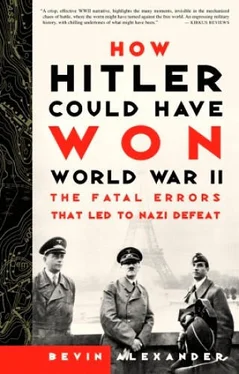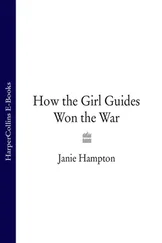p. 275: “the end of August.” Bradley wrote that the Americans began running out of gasoline on or about September 1. See Bradley and Blair, 321.
Chapter 23: The Battle of the Bulge
p. 276: “‘the objective Antwerp.’” Cole, The Ardennes, 2; MacDonald, 11. Another source for the battle is John S. D. Eisenhower, The Bitter Woods: The Battle of the Bulge (New York: Putnam, 1969; reprint New York: Da Capo, 1995).
p. 277: “‘the German officers corps.’” MacDonald, 21.
p. 278: “‘worth his while.’” Bradley, 454.
p. 280: “‘passed me on.’” Ibid., 467–69.
p. 280: “‘was really practicable.’” Liddell Hart, Other Side of the Hill, 447.
p. 281: “mount an offensive.” MacDonald, 79.
p. 281: “‘sonuvabitch gotten all his strength?’” Bradley, 466.
p. 281: “he held in reserve.” Eisenhower, 342.
p. 285: “massacring eighty-six American prisoners.” On July 11, 1946, an American war crimes court convicted Peiper, Sepp Dietrich, and seventy-one other defendants, all former SS officers or soldiers. Peiper and forty-two others were sentenced to death. In time, attitudes changed due to a political climate more favorable to the Germans and the admission by the American prosecution that it had gained confessions by using hoods (as if the questioner was to be executed), false witnesses, and mock trials. None of the guilty were executed. All were ultimately paroled: Sepp Dietrich in 1955 and Peiper just before Christmas 1956. Peiper found Germany hostile to him, however, and moved to a village in Alsace. In the summer of 1976, two weeks after a sensational article about him appeared in the French newspaper L’Humanité, firebombs destroyed Peiper’s house and killed the sixty-year-old former SS commander. See MacDonald, 216–23, 620–23.
p. 285: “help of ‘artificial moonlight.’” Liddell Hart, Other Side of the Hill, 459.
p. 287: “‘Christ come to cleanse the temple.’” Bradley and Blair, 365.
p. 287: “‘drive like hell.’” Bradley and Blair, 365–67; MacDonald, 514–21; Liddell Hart, Second World War, 656–57; Montgomery, 275–82.
p. 288: “‘Go to hell!’” MacDonald, 511–13.
p. 288: “‘when they were needed.’” Liddell Hart, Other Side of the Hill, 463.
p. 289: “lost a thousand aircraft.” MacDonald, 618.
Chapter 24: The Last Days
p. 290: “‘all this rubbish?’” Guderian, 382–83.
p. 291: “‘with what it’s got.’” Ibid., 387–88.
p. 293: “change Hitler’s mind.” Ibid., 393.
p. 293: “‘views on their superiors.’” Ibid., 397.
p. 294: “accused Guderian of treason.” Ibid., 401–2, 404–5.
p. 294: “all the more difficult.” On February 4–11, 1945, Roosevelt, Churchill, and Stalin met at Yalta, a resort on the Crimean peninsula. With victory only months away, the sole topic was the postwar world, especially eastern Europe. Stalin insisted on an eastern frontier of Poland approximating the line dividing German and Soviet occupation zones after the defeat of Poland in 1939. To compensate, the three Allied leaders agreed to extend Poland’s boundaries westward at the expense of Germany. The result established Germany’s eastern frontier along the Oder and Neisse rivers, giving Poland Silesia, Pomerania, and southern East Prussia (Russia took over northern East Prussia, including Königsberg). Stalin also backed a Polish government set up by himself (the Lublin government). The western Allies supported the Polish government in exile in London, but, since Russia occupied Poland, could do little to advance its cause. See Zabecki, vol. 1, 50–51 (Philip Green); Kimball, 308–18.
p. 294: “‘I can’t bear that.’” Guderian, 407; Shirer, 1097.
p. 296: “‘doesn’t fit the plan.’” Bradley and Blair, 405–7.
p. 297: “did not take place.” Shirer, 1103–5; Guderian, 422–24.
p. 298: “Eisenhower wrote.” Eisenhower, 396–97.
p. 299: “defense of the city.” Shirer, 1113.
p. 301: “‘be burned immediately.’” Ibid., 1123–27.
p. 302: “shot himself in the mouth.” There is some evidence that Hitler bit down on a cyanide capsule and almost simultaneously fired a bullet through his head. See Rosenbaum, 79–80.
Addington, Larry. The Blitzkrieg Era and the German General Staff. New Brunswick, N.J.: Rutgers University Press, 1971.
Alexander, Bevin. How Great Generals Win. New York: W. W. Norton, 1993.
Barnett, Corelli, ed. Hitler’s Generals. New York: Grove Weidenfeld, 1989.
———. The Desert Generals. Bloomington: Indiana University Press, 1982.
Bartov, Omer. Hitler’s Army. New York, London: Oxford University Press, 1992.
———. The Eastern Front, 1941–1945: German Troops and the Barbarization of Warfare. New York: St. Martin’s Press, 1986.
Bauer, Eddy. Der Panzerkriege. 2 vols. Bonn: Verlag Offene Worte, 1966.
Beaumont, Joan. Comrades in Arms. British Aid to Russia 1941–1945. London: Davis-Poynter, 1980.
Benoist-Méchin, Jacques. Sixty Days That Shook the West: The Fall of France, 1940. New York: G. P. Putnam’s Sons, 1963.
Bessel, Richard, ed. Life in the Third Reich. New York: Oxford University Press, 1987.
Blumenson, Martin. Breakout and Pursuit. Washington, D.C.: Office of the Chief of Military History, 1961.
———. The Duel for France. New York: Houghton Mifflin, 1963.
———. Patton: The Man Behind the Legend 1885–1945. New York: William Morrow, 1985.
———. Salerno to Cassino. Washington, D.C.: Office of the Chief of Military History, 1969.
———. Anzio: The Gamble That Failed. Philadelphia: J. B. Lippincott, 1963.
———. The Battle of the Generals: The Untold Story of the Falaise Pocket—The Campaign
That Should Have Won World War II. New York: William Morrow, 1993. Blumenson, Martin. The Patton Papers. 2 vols. Boston: Houghton Mifflin, 1972, 1974. Bradley, Omar N. A Soldier’s Story of the Allied Campaigns from Tunis to the Elbe. New
York: Henry Holt, 1951; London: Eyre & Spottiswoode, 1951. Bradley, Omar N., and Clay Blair. A General’s Life: An Autobiography. New York: Simon
& Schuster, 1983. Bryant, Arthur. The Turn of the Tide, 1939–1943: A History of the War Years Based on the
Diaries of Field-Marshal Lord Alanbrooke. Garden City, N.Y.: Doubleday, 1957.
———. Triumph in the West, 1943–1946. London: Grafton Books, 1986.
Bullock, Alan. Hitler, a Study in Tyranny. London: Harper Perennial, 1971, 1991.
Butcher, Capt. Harry C. My Three Years with Eisenhower. New York: Simon & Schuster, 1946; London: Heinemann, 1946.
Chapman, Guy. Why France Fell. New York: Holt, Rinehart and Winston, 1968.
Churchill, Winston S. The Second World War. 6 vols. Boston: Houghton Mifflin, 1948–1954; London: Cassell, 1948–1954.
———. The War Speeches of Winston S. Churchill. Compiled by Charles Eade. 3 vols.
Boston: Houghton Mifflin, 1953; London: Cassell, 1952. Clark, Alan. Barbarossa: Russian-German Conflict 1941–1945. New York: Morrow, 1965; London: Hutchinson, 1965.
Clark, Gen. Mark. Calculated Risk. New York: Harper, 1950; London: Harrap, 1951. Cole, Hugh M. The European Theater of Operations: The Lorraine Campaign. Washington, D.C.: Office of the Chief of Military History, 1950; reprint U.S. Army Center for Military History, 1984.
———. The European Theater of Operations: The Ardennes: The Battle of the Bulge. Washington, D.C. Office of the Chief of Military History, 1965; reprint U.S. Army Center for Military History, 1988.
Читать дальше


![Джонатан Димблби - Barbarossa - How Hitler Lost the War [calibre]](/books/385421/dzhonatan-dimblbi-barbarossa-how-hitler-lost-the-w-thumb.webp)









